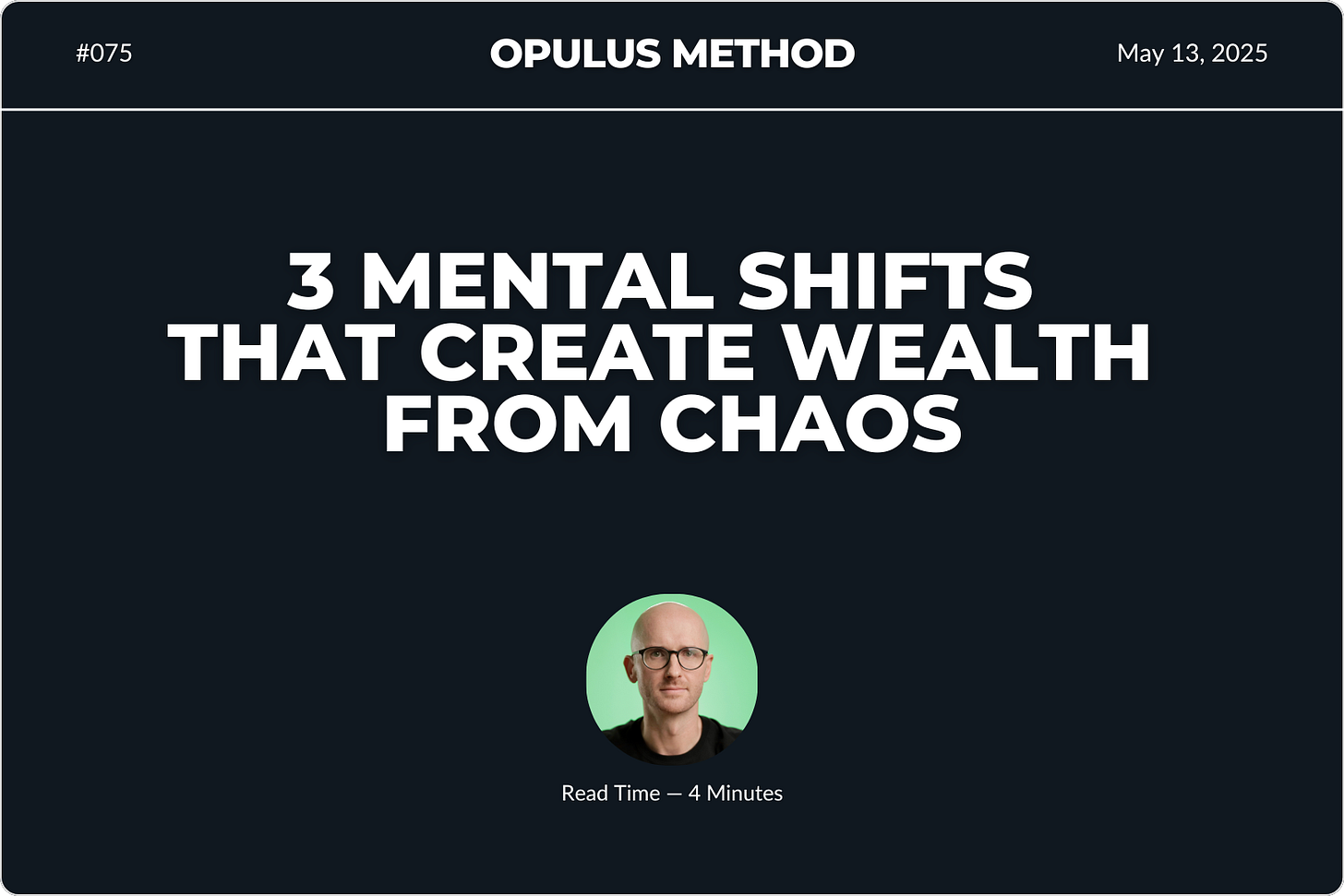3 Mental Shifts That Create Wealth From Chaos
Without letting your intelligence sabotage your returns.
Intelligence is your worst enemy during market crashes.
The skills that earned you a six-figure income—analysis, problem-solving, swift action—actually destroy your wealth when markets plummet.
From February to April, the S&P 500 dropped nearly 19%, triggering the exact psychological traps that cause successful professionals to make six-figure mistakes.
Morgan Housel's three counterintuitive mindset shifts transformed how I handle volatility forever. They're not complex strategies but simple mental reframes that let your portfolio thrive while others panic.
In this newsletter, you'll discover:
Why volatility is a fee, not a fine
How to simplify your investment approach
The behavior > intelligence equation
Practical applications for today's market
The automation system that removes emotion
Let's get into it.
Volatility Is a Fee, Not a Fine
Stop viewing market dips as punishment for your investment mistakes.
Volatility is simply the admission price you pay for higher returns. The historical outperformance of stocks over bonds or cash comes with a cost: emotional discomfort when markets drop.
Since 1980, the S&P 500 has experienced an average intra-year decline of 14%, yet finished with positive returns in 32 of those 44 years. That's the fee at work.
Think about it. You pay annual fees for your premium credit card. You pay more for quality in your business. You pay a trainer to push you at the gym. Yet when markets drop 10%, you feel robbed.
This mental accounting shift changes everything. Market dips aren't penalties — they're the cost of admission to wealth building.
Simplify Your Approach Drastically
The more complex your investment strategy, the more likely you'll abandon it when markets go wild.
Your high income gives you access to the "sophisticated" financial products that advisors love to pitch. But sophistication ≠ better returns. Each additional decision point in your investment strategy is another opportunity for fear to take over.
While most investors chase complex strategies with dozens of holdings across multiple accounts, the most successful investors use simple, rules-based approaches they can explain in under 30 seconds.
Ask yourself these questions:
Could I explain my investment strategy in one sentence?
Would I stick with it during a 30% market crash?
Does it require constant monitoring?
Fewer levers = fewer emotional mistakes. The best investment strategy isn't the one with the highest theoretical return. It's the one you'll actually stick with through volatility.
Focus on Behavior, Not Intelligence
Your career rewarded you for being the smartest person in the room. But great investing rewards those who can sit still when everyone else is panicking.
"Good investing is overwhelmingly about behavior, not what you know," Housel emphasizes. Your emotional response to volatility matters more than your IQ.
Most professionals excel at complex problem-solving. But investment success comes from temperament, not brilliance. Patience beats intelligence in the long run.
Warren Buffett isn't the world's greatest investor because he's smarter than everyone else—his genius is temperament.
During the 2008 crash, when everyone was selling, Buffett wrote in the New York Times, "Be fearful when others are greedy, and greedy when others are fearful." His patience, not his IQ, built his fortune.
Here's the brutal truth: your ability to stay invested during volatility will impact your returns far more than picking the "right" investments.
These three mindset shifts are particularly powerful for high earners facing today's market challenges.
How This Applies to High Earners
High earners face unique challenges that make these mindset shifts even more crucial.
You have more to lose (or at least it feels that way). Your six-figure income creates a false sense that you should be "better" at investing than others.
You're bombarded with sophisticated options. Hedge funds, alternative investments, private equity — the wealth management industry targets you specifically with complex products.
Your career success came from active problem-solving. The passive nature of smart investing feels counterintuitive.
But these mindset shifts work especially well for high earners because:
Your high savings rate means behavior matters more than fancy strategies
Your long time horizon magnifies the benefits of staying invested
Your professional skills are better applied to increasing income than outsmarting markets
Practical Applications for Today's Market
For "Volatility as a Fee":
Define what you're paying for (volatility) and commit to paying it. Write down your "volatility fee agreement" — how much market decline you're willing to accept as the normal cost of investing.
For "Simplify Your Approach":
Automate your investing to remove emotional decision points. Set up automatic transfers on payday that go straight to investments before you can talk yourself out of it.
For "Behavior Over Intelligence":
Delete your investment apps during market corrections. Checking portfolios daily during downturns is like picking at a wound. Give yourself permission to check quarterly instead.
Measure your investment success in decades, not months. Rewire your metrics for success to match the actual timeline of market returns.
Create a volatility response plan before you need it. Document exactly what actions you'll take (or not take) when markets drop 10%, 20%, or 30%.
The freedom comes from having the right systems in place before volatility hits.
That's It.
The biggest threat to your wealth isn't market crashes. It's your reaction to them.
Morgan Housel's framework isn't complicated. In fact, that's the point.
Simplicity beats complexity.
Behavior trumps intelligence.
Preparation defeats panic.
Most high earners will continue trying to outsmart markets with complex strategies. They'll panic when volatility strikes. They'll sell low and buy high despite knowing better.
But not you. Because you understand the truth: volatility is just the fee you pay for admission to long-term wealth.
Thanks to Morgan Housel and Chris Williamson for the insights shared in their podcast. Check out the full conversation for more wealth-building wisdom: How To Become Wealthy, Stay Wealthy & Be Happy | Modern Wisdom Podcast 222
See you next week,
Whenever you're ready, there are 2 other ways we can help you:
30-Day Strategy Sprint: Got a specific financial challenge holding you back? In just 30 days, we'll tackle 1-3 of your biggest money roadblocks and hand you a personalized action plan. Perfect if you want expert guidance without a long-term commitment. Limited spots available.
Ongoing Wealth Partnership: We'll work with you month after month to slash your taxes, find hidden income opportunities, and build lasting wealth. You set the life goals. We handle the financial strategy to get you there faster.
Opulus, LLC (“Opulus”) is a registered investment advisor in Pennsylvania and other jurisdictions where exempted. Registration as an investment advisor does not imply any specific level of skill or training.
The content of this newsletter is for informational purposes only and does not constitute financial, tax, legal, or accounting advice. It is not an offer or solicitation to buy or sell any securities or investments, nor does it endorse any specific company, security, or investment strategy. Readers should not rely on this content as the sole basis for any investment or financial decisions.
Past performance is not indicative of future results. Investing involves risks, including the potential loss of principal. There is no guarantee that any investment strategies discussed will result in profits or avoid losses.
All information is provided "as-is" without any warranties, express or implied. Opulus does not warrant the accuracy, completeness, or reliability of the information presented. Opinions expressed are those of the authors, Ryan Greiser and Francis Walsh, and are subject to change without notice.
Opulus is not responsible for any errors or omissions, nor for any direct, indirect, or consequential damages resulting from the use or reliance on this information. Use of the content is at your own risk. This content is not intended as an offer or solicitation in any jurisdiction where such an offer or solicitation would be illegal.





